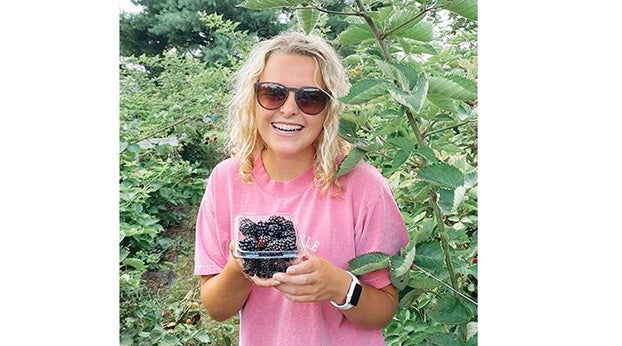UK student maps planting and use of blackberries in Grow Appalachia program; store-bought berries too expensive for man
Published 1:47 pm Tuesday, August 4, 2020

- UK student Lucinda Smith poses with blackberries. (Photo via UK)
By KATIE PRATT
University of Kentucky
A University of Kentucky student is contributing to nutrition research that could lead to healthier habits and fewer negative health outcomes in her native region.
“I have always wanted to give back to Eastern Kentucky,” said Lucinda Smith, a senior human-nutrition major from Corbin who is working with Dawn Brewer, an assistant professor in the Department of Dietetics and Human Nutrition in UK’s College of Agriculture, Food and Environment.
Brewer is leader of the Community Engagement Core of UK’s Superfund Research Center, which is funded by the National Institutes of Environmental Health Sciences. The core seeks to help people near hazardous waste find ways they can use nutrition to improve their health and reduce their risks of negative health impacts associated with exposure to pollutants from the sites.
This summer, Smith received undergraduate research funds from the college and department that allowed her to map the location of blackberry bushes distributed through the community engagement core and Berea College’s Grow Appalachia program earlier this year by the Cowan Community Center in Letcher County and the Red Bird Mission Community Outreach Clinic in Clay County. Each participant received six to eight bushes and growing supplies.
“In an earlier survey, many people in the project said they loved blackberries, but they were often too expensive for them to purchase,” Smith said. “Blackberries are also a plant that grows well in Kentucky and are easy to plant and maintain. They contain phytonutrients and antioxidants, which help reduce oxidation and inflammation.”
Smith’s project is measuring the amount of fruit each family harvests and how they use it, and mapping where the bushes and the demographic data of the 89 project participants. She collaborated with Josh Knight, UK senior extension associate with the Center for Crop Diversification, to make the maps and received location data from Grow Appalachia.
“Lucinda’s work gives a nice visual to share with our current and potential sponsors so they can see the reach of our program, particularly throughout Eastern Kentucky,” Brewer said.
Along with the maps, Smith has helped develop supplemental material for the BerryCare Extension curriculum, which was Brewer developed to teach people the health benefits of blackberries and ways to incorporate them into their diets.
Smith says she wants to become a family doctor and hopes to practice in Eastern Kentucky, and has developed a better understanding about the connections between nutrition and health.
“Through my human nutrition classes, I have been able to learn about the importance of a good diet, and by working with the Community Engagement Core, I have learned more about the effects of nutrition on the body,” Smith said. “I have also had the opportunity to shadow a family doctor who specializes in chronic care to see how diet has contributed to her patients’ chronic diseases.”






